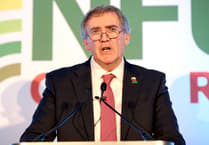The natural optimism of farmer, entrepreneur and charity worker, Llŷr Jones, shone through in an otherwise sobering CARAS Cymru Conference held at the Royal Welsh Showground in Builth Wells.
Navigating the Global Economic Landscape and its implications for future land use and food production in Wales was the conference theme.
Llŷr, who farms in Cerrigydrudion, told the gathering of elite Welsh farmers and agriculturalists that he looks for opportunity in any challenge. These include establishing a hydro plant and installing ground source heat pumps, as well as selecting white egg producing hens for efficiency and maximizing yield.
He explained that a ‘light bulb’ moment came in 2013 when he realised that without Single Farm Payment, his farm was losing money. The farm was now, after a lot of time, work and thought, resilient and providing a future for his family.
“When you get new policies and new rules coming in, I find they are just challenges that you have to overcome,” he said.
Examples of his adjustments include rearing 140 calves on a Cost of Production contract, after his feed bill increased by £30,000 a month after Ukraine was invaded. State of the art technology means he receives a text if one is unwell before there are any obvious signs.
He also changed to white hens because they produce 500 eggs a year, compared to a brown hen’s 340 eggs, increasing the flock’s egg production by three and a half million eggs. The move reduced the carbon footprint as the inputs are the same.
The Nitrate Vulnerable Zones (NVZs) posed a new challenge and Llŷr found he could overcome the problem by building a taller poultry shed. This helped to reduce the amount of muck produced and the height meant heat could be drawn off from the hens to the muck pile, so evaporating the water and halving the amount of muck to be removed.
Two lorry loads of muck are sent to a farm in Cambridge each month. The cost of returning the straw works out at £95 to £100 a tonne for barley straw, a saving as the market price is around £130.
The scene had been set by Dr Calvin Jones, professor of economics at Cardiff Business School. He began by saying the only certainty was uncertainty. The cost of inputs under the Trump administration was likely to be more of a challenge to Welsh farmers in a potentially tariff oriented world than international demand for Welsh food.
He predicted a refocusing on what we can do in our country. Politicians in Cardiff Bay were much more focused on local resources, circularity and sustainability. It’s about optimizing, for instance, land use.
Rory Hutchings, agricultural lawyer and partner at HCR Law, told of his concerns that land being used for natural capital could become the ‘new green coal mining’, with the money made flowing out of Wales.
The dial towards public goods and not paying for production was moving faster and faster. Head winds such as world economics, policy and NRW were all factors businesses have to try and cope with.
There would still be excellent food producing farm businesses, but they wouldn’t be just doing that. They would have to think about farming schemes and there could be great opportunities in terms of landscape, nature and natural resources to sustain the diversified farm business of the future.
The answer might not be about getting more stock or doing more hours, but to do proper succession planning and think about what might work best.




